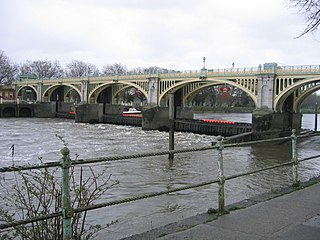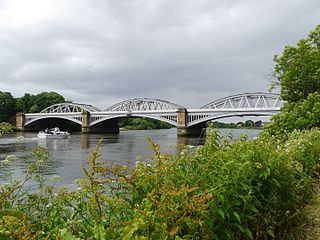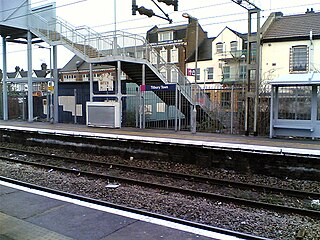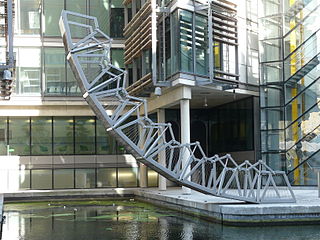
The Millennium Bridge, officially known as the London Millennium Footbridge, is a steel suspension bridge for pedestrians crossing the River Thames in London, England, linking Bankside with the City of London. It is owned and maintained by Bridge House Estates, a charitable trust overseen by the City of London Corporation. Construction began in 1998, and it initially opened on 10 June 2000.

The M20 is a motorway in Kent, England. It follows on from the A20 at Swanley, meeting the M25, and continuing on to Folkestone, providing a link to the Channel Tunnel and the ports at Dover. It is 50.6 miles (81.4 km) long. Although not signposted in England, this road is part of the European route E15. It is also used as a holding area for goods traffic when traffic across the English Channel is disrupted, such as Operation Stack and Operation Brock.

St Katharine Docks is a former dock and now a mixed-used district in Central London, in the London Borough of Tower Hamlets and within the East End. It lies on the north bank of the River Thames, immediately downstream of the Tower of London and Tower Bridge. From 1828 to 1968, it was one of the commercial docks that made up the Port of London. It is in the redevelopment zone known as Docklands and is now a popular housing and leisure complex.

The Hungerford Bridge crosses the River Thames in London, and lies between Waterloo Bridge and Westminster Bridge. Owned by Network Rail Infrastructure Ltd it is a steel truss railway bridge flanked by two more recent, cable-stayed, pedestrian bridges that share the railway bridge's foundation piers, and which are named the Golden Jubilee Bridges.

Richmond Lock and Footbridge is a lock, rising and falling low-tide barrage integrating controlled sluices and pair of pedestrian bridges on the River Thames in southwest London, England, and is a Grade II* listed structure. It is the furthest downstream of the forty-five Thames locks and the only one owned and operated by the Port of London Authority. It was opened in 1894 and is north-west of the centre of Richmond in a semi-urban part of southwest London. Downstream are Syon Park and Kew Gardens on opposite banks. It connects the promenade at Richmond with the neighbouring district of St. Margarets on the west bank during the day and is closed at night to pedestrians – after 19:30 GMT or after 21:30 when BST is in use. At high tide the sluice gates are raised and partly hidden behind metal arches forming twin footbridges.

Prince's Dock is a dock on the River Mersey, England, and part of the Port of Liverpool. It is the most southerly of the docks situated in the northern part of the Liverpool dock system, connected to Prince's Half-Tide Dock to the north. The dock is now in the buffer zone to one of Liverpool's World Heritage Sites.

The Lower Lea Valley is the southern end of the Lea Valley which surrounds the River Lea in eastern Greater London. It is part of the Thames Gateway redevelopment area and was the location of the 2012 Summer Olympics.

A footbridge is a bridge designed solely for pedestrians. While the primary meaning for a bridge is a structure which links "two points at a height above the ground", a footbridge can also be a lower structure, such as a boardwalk, that enables pedestrians to cross wet, fragile, or marshy land. Bridges range from stepping stones–possibly the earliest man-made structure to "bridge" water–to elaborate steel structures. Another early bridge would have been simply a fallen tree. In some cases a footbridge can be both functional and artistic.

The Royal Victoria Dock Bridge is a signature high-level footbridge crossing the Royal Victoria Dock in the Docklands area of east London designed by London-based architects and designers Lifschutz Davidson Sandilands. The bridge provides a direct link from Eastern Quay and Britannia Village, a residential development to the south of the dock, to the ExCeL Exhibition Centre and Custom House station, both situated to the north of the dock.

Newport is the second-busiest railway station in Wales. It is situated in Newport city centre and is 133 miles 13 chains (214.3 km) from London Paddington measured via Bristol Parkway, and 158 miles 50 chains (255.3 km) via Stroud.

Barnes Railway Bridge is a Grade II listed railway bridge in the London Borough of Richmond upon Thames and the London Borough of Hounslow. It crosses the River Thames in London in a northwest to southeast direction at Barnes. It carries the South Western Railway's Hounslow Loop Line, and lies between Barnes Bridge and Chiswick stations. It can also be crossed on foot, and is one of only three bridges in London to combine pedestrian and rail use; the others being Hungerford Bridge and Golden Jubilee Bridges and Fulham Railway Bridge.

Tilbury Town railway station is on a loop line of the London, Tilbury and Southend line, serving the town of Tilbury, Essex. It is 21 miles 48 chains (34.8 km) down the line from London Fenchurch Street via Rainham and it is situated between Grays and East Tilbury. Its three-letter station code is TIL.

The Wards Island Bridge, also known as the 103rd Street Footbridge, is a bridge crossing the Harlem River between Manhattan Island and Wards Island in the Manhattan borough of New York City that does not allow vehicular traffic. The vertical lift bridge has a total of twelve spans consisting of steel towers and girders. It carries only pedestrian and bicycle traffic.

The Rolling Bridge is a kinetic sculpture, and a unique type of curling moveable bridge, completed in 2004 as part of the Grand Union Canal office and retail development project at Paddington Basin, London.

The East River Greenway is an approximately 9.44-mile-long (15.19 km) foreshoreway for walking or cycling on the east side of the island of Manhattan on the East River. It is part of the Manhattan Waterfront Greenway. The largest portions are operated by the New York City Department of Parks and Recreation. It is separated from motor traffic, and many sections also separate pedestrians from cyclists. The greenway is parallel to the Franklin D. Roosevelt East River Drive for a majority of its length.

During the twenty-four hours before Friday 20 November 2009, rainfall of over 300 mm (12 in) was recorded in Cumbria. Flooding along the Borrowdale and Derwent Valley meant that some areas were up to 8 feet (2.4 m) deep in water. The surge of water off the fells of the Lake District which flowed into Workington down the River Derwent washed away a road bridge and a footbridge. PC Bill Barker was killed when Northside Bridge collapsed. The cemetery at Camerton, historically the burial ground for the community of Seaton, was badly damaged with many gravestones being damaged or upturned.

Dukes Meadows Footbridge is a pedestrian bridge beside the River Thames in Chiswick in West London. Opened in 2023, it allows the Thames Path on the north bank at Dukes Meadows to follow the river without diversion.

Scale Lane Footbridge is an apostrophe-shaped pedestrian swing bridge in Hull, England. The bridge has a rotating mechanism, allowing it to swing open horizontally, letting vessels pass beneath on the River Hull. It was the first bridge in the world to allow pedestrians to remain on the bridge while it is in motion.



















